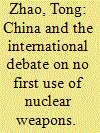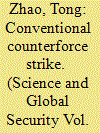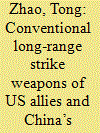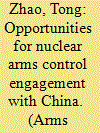| Srl | Item |
| 1 |
ID:
187516


|
|
|
|
|
| Summary/Abstract |
China is the only nuclear-armed country in the world that has an unconditional No First Use (NFU) of nuclear weapons policy. China’s practice of this policy and its impact on international security have important implications for the international debate around NFU and inform other countries’ potential consideration of NFU. Whether NFU policy could deliver the expected benefits of reducing the role of nuclear weapons, containing nuclear arms competition, and mitigating the risk of nuclear proliferation depends on the perceived credibility by other countries of such policy. This paper examines a number of internal challenges that may affect the perceived credibility of China’s NFU policy. One of them is Chinese military strategists’ expressed interest in threatening nuclear use in a conventional conflict under certain conditions through the so-called “lower the nuclear coercion threshold” operation. The others include the lack of institutional constraint in the Chinese system to ensure implementation of NFU and the growing ambiguities about the NFU policy’s applicability in specific scenarios as a result of new technological development. The paper offers recommendations on how China can address these challenges and work with other countries to create the conditions for the international adoption of NFU, including how to address the concerns of nonnuclear weapons states about the conventional-level security consequences. It concludes by discussing how China and the other nuclear-armed states can better fulfill their disarmament obligations by strengthening the existing NFU policy and promoting credible NFU policy more broadly.
|
|
|
|
|
|
|
|
|
|
|
|
|
|
|
|
| 2 |
ID:
108152


|
|
|
|
|
| Publication |
2011.
|
| Summary/Abstract |
China and some other nuclear-armed countries have become concerned about the development and deployment of U.S. conventional global strike systems that may permit damage limitation operations against the nuclear forces of adversaries. This article argues that a counterforce strike is more likely to target tactical nuclear forces than intercontinental ballistic missiles and provides an analysis of the probability that U.S. conventional strikes might destroy China's theater nuclear forces which include DF-3A, DF-4, DF-21, DF-31 missiles, Type 094 nuclear submarines, and nuclear-capable H-6 bombers. The results indicate that China's strategy of building robust underground facilities may effectively protect its nuclear forces from preemptive strikes making it unlikely that a U.S. conventional strike could destroy a meaningful part of China's theater nuclear forces. This study also assesses the potential capabilities of future conventional prompt global strike systems, points out problems with the strategy of damage limitation, and proposes that the United States consider improving strategic stability in its relationship with China rather than threatening a preemptive strike.
|
|
|
|
|
|
|
|
|
|
|
|
|
|
|
|
| 3 |
ID:
182642


|
|
|
|
|
| Summary/Abstract |
Conventional long-range strike weapons of US allies may exacerbate Chinese concerns about the survivability of its small nuclear arsenal against a precision pre-emptive strike from the US-led coalition, although the degree of the new threat depends on various factors including the numbers and types of such weapons to be deployed. Conventional hypersonic missiles, in particular, may generate acute threat perception, as they can play the role of “door kicker” against China’s so-called anti-access, area-denial capabilities and pave the way for subsequent massive strikes with more traditional weapons. The development of conventional long-range-strike weapons by US allies also affects the risk of conventional conflicts escalating inadvertently to the nuclear level. Such risks are particularly salient in the Asia–Pacific region because of at least two factors: the ambiguous role of Chinese theater nuclear weapons and significant entanglement of conventional and nuclear capabilities at the theater level. Such conventional capabilities of US allies also help shape the region’s overall military balance—something China treats as part of its broader understanding of the term “strategic stability.” Regional players, however, have competing visions about what constitutes a stable military balance. They also have conflicting interpretations of why other parties are pursuing conventional long-range-strike weapons. The development of such capabilities will pose growing challenges to regional strategic stability in the future.
|
|
|
|
|
|
|
|
|
|
|
|
|
|
|
|
| 4 |
ID:
170743


|
|
|
|
|
| Summary/Abstract |
The clock is ticking on an extension of the 2010 New Strategic Arms Reduction Treaty (New START). To complicate matters, instead of extending the treaty as is, Washington seeks to broaden the existing U.S.-Russian agreement by including China in a new trilateral arms control framework. There is no chance that Beijing would change its long-held views on arms control within the next 12 months before New START expires. Nonetheless, China’s growing military power and influence are producing counterpressures for China to deepen its participation in arms control. At a time when President Xi Jinping said China should “take center stage in the world,”1 China may find itself having to seriously prepare for major-power competitions and major-power arms control.
|
|
|
|
|
|
|
|
|
|
|
|
|
|
|
|